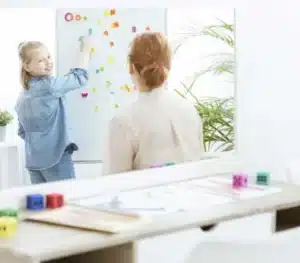By Angela Kurdzhukyan, OTR/L
As parents, teachers, and caregivers we are often under the impression that we must always guide children. We tell them what they should be doing, how they should be doing it, and try to create strict rules to follow. Although these techniques can be useful for setting boundaries and preparing children for future roles that require these skills (e.g., following directions in the classroom), children learn best when self-led.
Developmental psychologist Erik Erikson concluded through his studies that children between the ages of 2-5 want and need to develop a sense of independence and personal control over their physical abilities and environment. Allowing a child to guide a play or educational session can not only increase their self-efficacy (how they feel about themselves) but can also decrease negative behaviors (e.g., tantrums) and thoughts (feelings of shame, doubt, guilt). For example, a child told “this is what we’re doing right now” may feel upset as they weren’t given a choice or an opinion.
Children also perform better across domains when in familiar settings. To challenge a child who has mastered their familiar environments and improve their cognitive, social, and motor responses try to switch things up. That might look like playing with different peers/family or playing in a different setting (e.g., unfamiliar park).
To encourage children to be leaders we can:
- Offer choices (gives them a voice in the matter)
- Provide praise when they demonstrate a positive response after a “failed” attempt (demonstrates learning from their mistakes)
- Encourage repetition (repetition increases a chance for a successful response)
- Give guiding prompts as opposed to intrusive ones (e.g., “oh is something in your way” as opposed to “the toy is blocking the race track”)
Children learn best when they are active participants. Allowing them to explore and learn from their errors provides opportunities for learning. These skills are especially important as they can set the foundation for decision making, motor planning/praxis, and problem solving.




